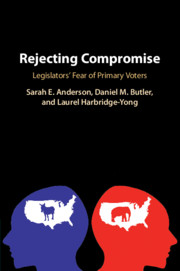Book contents
- Rejecting Compromise
- Rejecting Compromise
- Copyright page
- Contents
- Figures
- Tables
- Acknowledgments
- 1 Rejecting Compromise, Getting Gridlock
- 2 Legislators Reject Half-Loaf Compromises
- 3 Legislators Reject Half-Loaf Compromises Because They Fear Voter Retribution
- 4 Primary Voters as the Source of Punishment
- 5 Voter Punishment Is Rare but Real
- 6 Structuring Negotiations in the Shadow of Primary Voter Punishment
- 7 Compromise, Voter Punishment in Primaries, and Legislative Gridlock
- References
- Index
2 - Legislators Reject Half-Loaf Compromises
Published online by Cambridge University Press: 28 January 2020
- Rejecting Compromise
- Rejecting Compromise
- Copyright page
- Contents
- Figures
- Tables
- Acknowledgments
- 1 Rejecting Compromise, Getting Gridlock
- 2 Legislators Reject Half-Loaf Compromises
- 3 Legislators Reject Half-Loaf Compromises Because They Fear Voter Retribution
- 4 Primary Voters as the Source of Punishment
- 5 Voter Punishment Is Rare but Real
- 6 Structuring Negotiations in the Shadow of Primary Voter Punishment
- 7 Compromise, Voter Punishment in Primaries, and Legislative Gridlock
- References
- Index
Summary
Do a large fraction of legislators reject compromises, even when the compromise moves policy toward their preferred outcome? This chapter uses surveys of state legislators and elected city officials to assess what fraction of officials reject half-loaf compromises that give them some, but not all of what they seek on policy. Nearly a quarter of state legislators say they would reject a proposal that moves the gas tax toward their preferred outcome. Legislators’ rejection of half-loaf compromises exacerbates the difficulties of solving problems in a political environment polarized along ideological lines.
Keywords
- Type
- Chapter
- Information
- Rejecting CompromiseLegislators' Fear of Primary Voters, pp. 15 - 36Publisher: Cambridge University PressPrint publication year: 2020

